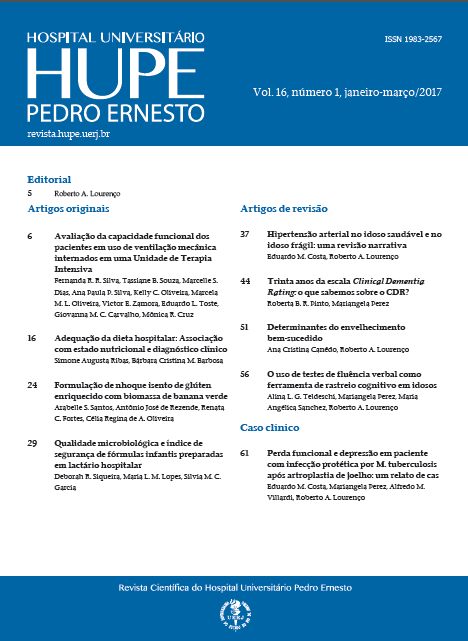Hipertensão arterial no idoso saudável e no idoso frágil: uma revisão narrativa
DOI:
https://doi.org/10.12957/rhupe.2017.33267Resumo
Introdução: Sabe-se que, com o envelhecimento populacional, a prevalência de doenças crônicas, como a hipertensão arterial (HA), aumenta. Além disso, a fisiologia do envelhecimento e de comorbidades a ele associadas faz com que seja necessário rever pontos de corte para definição de hipertensão no idoso, principalmente nos mais frágeis. Objetivo: Descrever, por meio de uma revisão narrativa, as recomendações para o tratamento da HA no paciente idoso e, especialmente, no frágil. Métodos: revisão bibliográfica referente à HA no idoso, em bases de dados de pesquisa on-line. Resultados: Foram compiladas diretrizes nacionais, internacionais, além de artigos originais e de revisão sobre o assunto. Observou-se que não há um consenso quanto ao tratamento da HA, que este tratamento deve ser individualizado e que os efeitos colaterais das medicações precisam ser levados em consideração. Conclusão: Concluímos que os efeitos colaterais e interações entre drogas devem ser considerados na escolha da medicação. Entende-se que a hipotensão pode predispor a efeitos indesejados como quedas e sonolência, por estes motivos, tanto o nível de referência quanto o alvo a ser atingido são maiores do que na população mais jovem.
Descritores: Hipertensão arterial; Idoso; Fragilidade.
Referências
Campana EMG, Freitas EV, Brandão AA, et al. Hipertensão arterial no idoso. In: Freitas EV, Py L. Tratado de Geriatria e Gerontologia. 4ª Edição. Rio de Janeiro: Guanabara Koogan. 2016. p. 839-60.
VII Diretrizes Brasileiras de Hipertensão. Arq Bras Cardiol. 2016;107(supl. 3).
Fox CS, Evans JC, Larson MG, et al. Temporal trends in coronary heart disease mortality and sudden cardiac death from 1950 to 1999: the Framingham Heart Study. Fox CS, Evans JC, Larson MG, Kannel WB, Levy D. Circulation 2004;110:522-7.
2013 ESH/ESC Guidelines for the management of arterial hypertension. The Task Force for the management of arterial hypertension of the European Society of Hypertension (ESH) and of the European Society of Cardiology (ESC). Journal of Hypertension. 2013;31:1281-357.
2014 Evidence based guideline for the management of high blood pressure in adults: Report from the panel members appointed to the Eighth Joint National Committee (JNC 8). JAMA. 2014;311(5):507-20.
Ogliari G, Westendorp R, Muller M, et al. Blood pressure and 10-year mortality risk in the milan geriatrics 75+ cohort study: role of functional and cognitive status. Age Ageing. 2015;44:932-7.
Fried LP, Tangen CM, Walston J, et al. Frailty in older adults: evidence for a phenotype. J Gerontol A Biol Sci Med Sci. 2001;56(3):146-56.
Moreira VG, Lourenço RA. Prevalence and factors associated with frailty in an older population from the city of Rio de Janeiro, Brazil: the FIBRA-RJ Study. Clinics (SP). 2013;68(7)979-85.
Benetos A, Rossignol P, Cherubini A, et al. Polypharmacy in the aging patient: management of hypertension in octogenarians. JAMA. 2015;314:170-80.
Bastos-Barbosa RG, Ferriolli E, Coelho EB, et al. Association of frailty syndrome in the elderly with higher blood pressure and other cardiovascular risk factors. American Journal of Hypertision. 2012;25(11).
Odden M, Beilby P, Peralta C. Blood pressure in older adults: the importance of frailty. Curr Hypertens Rep. 2015;17(55).
Warwick J, Falaschetti E, Rockwood K, et al. No evidence that frailty modifies the positive impact of antihypertensive treatment in very elderly people: an investigation of the impact of frailty upon treatment effect in the hypertension in the very elderly trial (HYVET) study, a double-blind, placebo controlled study of antihypertensives in people with hypertension aged 80 and over. BMC Med. 2015;13:78.
Charlesworth C, Peralta C, Odden M. Functional status and antihypertensive therapy in older adults: a new perspective on old data. Am J Hypertens. 2016;29:690-5.
SHEP cooperative research group. Prevention of stroke by antihypertensive drug treatment in older persons with isolated systolic hypertension. Final results of the Systolic hypertension in the elderly program (SHEP). JAMA. 1991;265:3255-64.
Mancia G, Grassi G. Aggressive blood pressure lowering is dangerous: the J-curve: pro side of the argument. Hypertension. 2014;63:29-36.
Benetos A, Labat C, Rossignol P, et al. Treatment with multiple blood pressure medications, achieved blood pressure, and mortality in older nursing homeresidents: the PARTAGE study. JAMA Intern Med. 2015;175:989-95.
Benetos A, Rossignol P, Cherubini A, et al. Polypharmacy in the aging patient: management of hypertension in octogenarians. JAMA. 2015;314:170-80.
Bejan-Angoulvant T, Saadatian-Elahi M, Wright J, et al. Treatment of hypertension in patients 80 years and older: the lower the better? A meta-analysis of randomized controlled trials. J Hypertens. 2010;28:1366-72.
Page A, Clifford R, Potter K, et al. The feasibility and the effect of deprescribing in older adults on mortality and health: a systematic review. Br J Clin Pharmacol. 2016;82:583-623.
Scott I, Hilmer S, Reeve E, et al. Reducing inappropriate polypharmacy the process of deprescribing. JAMA Intern Med. 2015;175:827-34.
Ferri C, Ferri L, Desideri G. Management of hypertension in the elderly and frail elderly. High Blood Press Cardiovasc Prev. 2017;24:1.
Ravindrarajah R, Hazra NC, Hamada S, et al. Systolic blood pressure trajectory, frailty and all-cause mortality over 80 years of age. Cohort study using electronic health records. Circulation. 2017;135(24):2357-68.
Chudiak A, Jankowska-Polańska B, Uchmanowicz I. Effect of frailty syndrome on treatment compliance in older hypertensive patients. Clinical Interventions in Aging. May 2017:12.
Jankowska-Polańska A, Dudek K, Szymanska-Chabowska A, Uchmanowicz I. The influence of frailty syndrome on medication adherence among elderly patients with hypertension. Clinical Interventions in Aging. 2016;11:1781-90.
Ettehad D, Emdin CA, Kirin A, et al. Blood pressure lowering for prevention of cardiovascular disease and death: a systematic review and meta-analysis. Lancet. 2015;387:957-67.
Goodwin JS. Gait speed. An important vital sign in old age. Arch Intern Med. 2012;172:1168-9.


